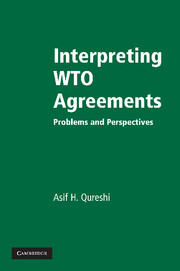Book contents
- Frontmatter
- Contents
- Preface
- List of Abbreviations
- Introduction
- 1 Interpreting principles of treaty interpretation in the WTO
- 2 Interpreting institutional aspects of the WTO Agreements
- 3 The national dimension to interpretation in the framework of the WTO
- 4 Interpreting exceptions in the WTO Agreements
- 5 Interpreting the WTO Agreements for the development objective
- 6 ‘Interpreting’ in external concerns
- 7 Interpreting the agreements on trade remedies
- Conclusion
- Annexes
- Index
3 - The national dimension to interpretation in the framework of the WTO
Published online by Cambridge University Press: 23 February 2010
- Frontmatter
- Contents
- Preface
- List of Abbreviations
- Introduction
- 1 Interpreting principles of treaty interpretation in the WTO
- 2 Interpreting institutional aspects of the WTO Agreements
- 3 The national dimension to interpretation in the framework of the WTO
- 4 Interpreting exceptions in the WTO Agreements
- 5 Interpreting the WTO Agreements for the development objective
- 6 ‘Interpreting’ in external concerns
- 7 Interpreting the agreements on trade remedies
- Conclusion
- Annexes
- Index
Summary
Introduction
Interpretation of international agreements by judicial organs in international organisations can have legislative characteristics. Interpretation by States of their international commitments can equally spawn ‘second-generation’ norms reflecting the expression of national perspectives, within and outside the residual freedom that may accompany the international undertaking. Both national interpretations and domestic processes of interpretation interface with the WTO dispute settlement process and the implementation of the WTO Agreements. International agreements comprise a mix of ‘agreements’ and ‘disagreements’. They harbour future discontent and opportunities. Once established, the agreements have to be interpreted at the international level with respect to domestic legislation, and in this manner enforced. By the same token, the agreements have to be interpreted at the national level in order to be implemented – as indeed do national trade measures that have an impact on international trade. However, implementation by a State of its international undertakings is a process organically removed from the agreement itself and from its constituent organisation. It is undertaken by the independent entity of the State, which has a momentum of its own. Domestic implementation by the State of an international agreement involves an internal process within the State of understanding and discourse with respect and in relation to the agreement, leading to an interpretation that is expressed both in words and in deeds.
Interpretation of the WTO Agreements at the national level is to be found in the way the WTO Agreements are translated into the national language, re-formulated in domestic legislation, interpreted in national tribunals and courts, and actually administered by agents of the State.
- Type
- Chapter
- Information
- Interpreting WTO AgreementsProblems and Perspectives, pp. 70 - 86Publisher: Cambridge University PressPrint publication year: 2006



